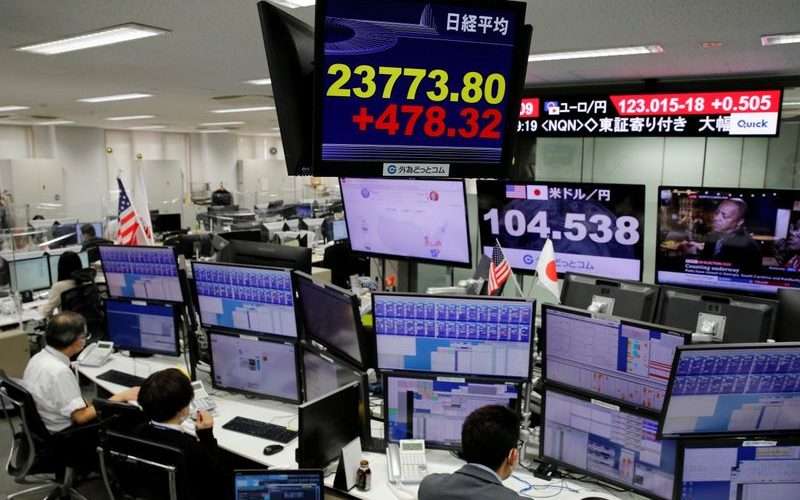Asian shares eked out gains on Friday and U.S. stock futures turned higher after U.S. president-elect Joe Biden was projected to win the battleground state of Arizona, cementing his win for the office.
The projection by Edison Research dealt another blow to President Donald Trump’s struggling effort to overturn the results of the Nov. 3 presidential election.
S&P 500 e-mini futures inched out of negative territory on the news but without much conviction, and were last up just 0.03%.
European futures remained resolutely dour, with pan-region Euro Stoxx 50 futures down 0.67%, German DAX futures down 0.6% and FTSE futures off 1.1%.
That came after selloffs in the United States and Europe on Thursday as investors feared the economic impact of accelerating coronavirus infections.
The United States has reported fresh daily records for new COVID-19 case hospitalisations this week, prompting cities and states, including Chicago, Detroit and California, to re-impose public health restrictions.
European officials have also warned against complacency and said measures to control infections must continue despite hopes that vaccines under development could help to slow the spread of the novel coronavirus.
U.S. Federal Reserve Chair Jerome Powell said on Thursday during a discussion with other central bankers that progress in developing a coronavirus vaccine was welcome news but that near-term economic risks remain as infections accelerate, underscoring the likely need for additional government stimulus.
MSCI’s broadest index of Asian shares outside Japan edged up 0.1%, reversing earlier losses. For the week it rose about 0.7%.
But apart from a 0.71% gain in Seoul’s Kospi, most major regional indexes were lower on Friday.
Australian shares lost 0.2%, the Hang Seng was 0.48% lower and Chinese blue-chips slumped 1.57%, dragged lower by the Trump administration’s decision to ban U.S. investments in firms linked to the Chinese military, and by a series of high-profile bond defaults by state-owned enterprises.
Japan’s Nikkei 225 fell 0.57%.
Some investors saw a buying opportunity in the market weakness.
“My view is this is the dark just before dawn,” said Michael Frazis, portfolio manager at Frazis Capital Partners in Sydney.
“You’ve got the second wave of coronavirus, new sets of shutdowns, clear problems around the world, travel dropping off again… But at the same time, we have the strongest possible evidence that we do have a vaccine…”
“We think this is all actually very positive and it’s actually a good time to be investing in markets,” he said.
Frazis said many risks nevertheless remained for short-term traders amid ongoing uncertainty over issues such as fresh U.S. stimulus.
On Thursday, top Democrats in the U.S. Congress urged renewed negotiations over a multitrillion-dollar coronavirus aid proposal, but the top Republican immediately rejected their approach as too expensive, continuing a months-long impasse.
Wall Street dropped on Thursday in a broad sell-off.
The Dow Jones Industrial Average fell 1.08%, pulled lower by industrial and financial companies sensitive to economic growth. The S&P 500 lost 1.00% and the technology-heavy Nasdaq Composite dropped 0.65%.
U.S. Treasury yields also sank on Thursday, weighed down by the persistent rise in coronavirus cases and data showing inflation remained benign in the world’s largest economy. The U.S. yield curve, viewed in part as a gauge of risk appetite, also flattened.
On Friday, U.S. yields continued to tick lower, with benchmark 10-year Treasury notes yielding 0.8701%, compared to a Thursday close of 0.886%.
“Bond yields, which had been flirting with the 1.0% level in terms of the U.S. 10Y Treasury, have … snapped back sharply in terms of yield,” Rob Carnell, Asia Pacific head of research at ING said in a note.
“That move most likely got a further nudge from the softer-than-expected U.S. inflation data for October which were released yesterday, and which tally with a weaker economic reality.”
Rising risk aversion lifted the safe-haven yen, with the dollar dropping 0.25% against the Japanese currency to 104.86 . The euro was a touch higher at $1.1809 and the dollar index ticked lower to 92.926.
An unexpected rise in U.S. crude stockpiles exacerbated virus-linked economic fears in commodity markets, pushing U.S. crude 1.85% lower to $40.36 per barrel.
Global benchmark Brent crude dropped 1.47% to $42.89.
Spot gold gained 0.18% to $1,879.06 per ounce.










Add comment